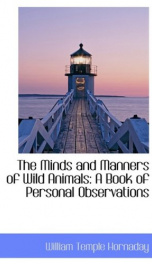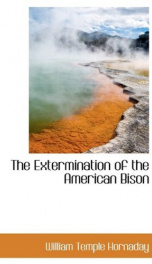Hornaday William Temple

William Temple Hornaday, Sc.D. (December 1, 1854 – March 6, 1937) was an American zoologist, realtor, conservationist, author, poet and songwriter. He revolutionized museum exhibits by displaying wildlife in their natural settings, and is credited with discovering the American crocodile, saving the American bison and the Alaskan fur seal from extinction. Hornaday was born in Plainfield, Indiana, and educated at Oskaloosa College, the Iowa State Agricultural College (now Iowa State University) and in Europe. He spent 1.5 years, 1877-1878 in India and Ceylon collecting specimens. In May 1878 he reached southeast Asia and traveled in Malaya and Sarawak in Borneo. He served as chief taxidermist of the United States National Museum in 1882–1890. He helped found the Smithsonian National Zoological Park in Washington, D.C.[1] He was appointed director of the New York Zoological Park in 1896 and became president of the Permanent Wild Life Protective Association. He co-founded (with Theodore Roosevelt) the American Bison Society in 1905 and served as its president from 1907 to 1910.[2][3] He was able to exert some influence which led to the passage of legislation which extended protection to wild birds, game, bison, seals, and wild life in general. Hornaday wrote many magazine articles and books. Dr. Hornaday's tenure as director of the zoo met some controversy in September 1906, when Ota Benga, a pygmy native of the Congo, was placed on display in the monkey house. Benga shot targets with a bow and arrow, wove twine, and wrestled with an orangutan. Although, according to the New York Times, "few expressed audible objection to the sight of a human being in a cage with monkeys as companions,” controversy erupted as black clergymen in the city took great offense. “Our race, we think, is depressed enough, without exhibiting one of us with the apes,” said the Reverend James H. Gordon, superintendent of the Howard Colored Orphan Asylum in Brooklyn. “We think we are worthy of being considered human beings, with souls.”[4] New York Mayor George B. McClellan, Jr. refused to meet with the clergymen, drawing the praise of Dr. Hornaday, who wrote to him, “When the history of the Zoological Park is written, this incident will form its most amusing passage.”[4] As the controversy continued, Hornaday remained unapologetic, insisting that his only intention was to put on an “ethnological exhibit.” In another letter, he said that he and Madison Grant, the secretary of the New York Zoological Society, who ten years later would publish the racist tract “The Passing of the Great Race,” considered it “imperative that the society should not even seem to be dictated to” by the black clergymen.[4] Still, Hornaday decided to close the exhibit after just two days, and on Monday, September 8, Benga could be found walking the zoo grounds, often followed by a crowd “howling, jeering and yelling."[4] Hornaday had a large impact on the Scouting movement and especially the Boy Scouts of America (BSA). Not only is there is a series of conservation awards named after him, but his beliefs and writings are a major reason conservation and ecology have long been an important part of the BSA's program.[5] This awards program was created in 1915 by Dr. Hornaday. He named the award the Wildlife Protection Medal. Its purpose was to challenge Americans to work constructively for wildlife conservation and habitat protection. After his death in 1938, the award was renamed in Dr. Hornaday's honor and became a BSA award. Hornaday died in Stamford, Connecticut and was buried in Greenwich, Connecticut.[3][6]
do you like this author?
What readers are saying
What do you think? Write your own comment on this book!
write a commentWhat readers are saying
What do you think? Write your own comment on this author!
write a commentBook list

Our Vanishing Wild Life
Series:
Unknown
Year:
Unknown
Raiting:
3.5/5
Originally published in 1913. This volume from the Cornell University Library's print collections was scanned on an APT BookScan and converted to JPG 2000 format by Kirtas Technologies. All titles scanned cover to cover and pages may include marks notations and other marginalia present in the original volume.
Show more
add to favoritesadd In favorites

The Minds and Manners of Wild Animals
Series:
Unknown
Year:
Unknown
Raiting:
2.5/5
A book of personal observations. --This text refers to an alternate Paperback edition.
Show more
add to favoritesadd In favorites

The Extermination of the American Bison
Series:
Unknown
Year:
Unknown
Raiting:
2.5/5
The Extermination of the American Bison belongs to the pen of a a famous American zoologist, poet and author William Temple Hornaday (1854-1937). During his whole life he was interested in different species of animals and he even spent fifteen years in India and Ceylon gather information and taking notes. Afterwards Hornaday traveled to Asia and stayed for quite a long time there. In 1896 the scientist got the position of the director of the New York Zoological Park. Later he was appointed as the president of the Permanent Wild Life Protective Association, and also served as the president of the American Bison Society. The Extermination of the American Bison was published for the first time in 1889 and since then it has been very popular among zoologists and everyone who loves and cares about the wild nature.
Show more
add to favoritesadd In favorites
Book list

Our Vanishing Wild Life
Series:
Unknown
Year:
Unknown
Raiting:
3.5/5
Originally published in 1913. This volume from the Cornell University Library's print collections was scanned on an APT BookScan and converted to JPG 2000 format by Kirtas Technologies. All titles scanned cover to cover and pages may include marks notations and other marginalia present in the original volume.
Show more
add to favoritesadd In favorites

The Minds and Manners of Wild Animals
Series:
Unknown
Year:
Unknown
Raiting:
2.5/5
A book of personal observations. --This text refers to an alternate Paperback edition.
Show more
add to favoritesadd In favorites

The Extermination of the American Bison
Series:
Unknown
Year:
Unknown
Raiting:
2.5/5
The Extermination of the American Bison belongs to the pen of a a famous American zoologist, poet and author William Temple Hornaday (1854-1937). During his whole life he was interested in different species of animals and he even spent fifteen years in India and Ceylon gather information and taking notes. Afterwards Hornaday traveled to Asia and stayed for quite a long time there. In 1896 the scientist got the position of the director of the New York Zoological Park. Later he was appointed as the president of the Permanent Wild Life Protective Association, and also served as the president of the American Bison Society. The Extermination of the American Bison was published for the first time in 1889 and since then it has been very popular among zoologists and everyone who loves and cares about the wild nature.
Show more
add to favoritesadd In favorites
What readers are saying
What do you think? Write your own comment on this author!
write a commentif you like Hornaday William Temple try:
readers also enjoyed
What readers are saying
What do you think? Write your own comment on this author!
write a commentif you like Hornaday William Temple try:
readers also enjoyed
Do you want to exchange books? It’s EASY!
Get registered and find other users who want to give their favourite books to good hands!

